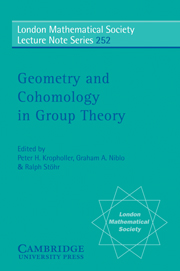Book contents
- Frontmatter
- Contents
- Preface
- List of Participants
- On the Cohomology of SL2(ℤ[1/p])
- Cohomology of Sporadic Groups, Finite Loop Spaces, and the Dickson Invariants
- Kernels of Actions on Non-positively Curved Spaces
- Cyclic Groups Acting on Free Lie Algebras
- Cohomology, Representations and Quotient Categories of Modules
- Protrees and Λ-trees
- Homological Techniques for Strongly Graded Rings: A Survey
- Buildings are CAT(0)
- On Subgroups of Coxeter Groups
- The p-primary Farrell Cohomology of Out(Fp–1)
- On Tychonoff Groups
- Word Growth of Coxeter Groups
- Poly-surface Groups
- Analytic Versions of the Zero Divisor Conjecture
- On the Geometric Invariants of Soluble Groups of Finite Prüfer Rank
- Some Constructions Relating to Hyperbolic Groups
- Free Actions of Abelian Groups on Groups
- Finitely Presented Soluble Groups
Cohomology, Representations and Quotient Categories of Modules
Published online by Cambridge University Press: 01 April 2010
- Frontmatter
- Contents
- Preface
- List of Participants
- On the Cohomology of SL2(ℤ[1/p])
- Cohomology of Sporadic Groups, Finite Loop Spaces, and the Dickson Invariants
- Kernels of Actions on Non-positively Curved Spaces
- Cyclic Groups Acting on Free Lie Algebras
- Cohomology, Representations and Quotient Categories of Modules
- Protrees and Λ-trees
- Homological Techniques for Strongly Graded Rings: A Survey
- Buildings are CAT(0)
- On Subgroups of Coxeter Groups
- The p-primary Farrell Cohomology of Out(Fp–1)
- On Tychonoff Groups
- Word Growth of Coxeter Groups
- Poly-surface Groups
- Analytic Versions of the Zero Divisor Conjecture
- On the Geometric Invariants of Soluble Groups of Finite Prüfer Rank
- Some Constructions Relating to Hyperbolic Groups
- Free Actions of Abelian Groups on Groups
- Finitely Presented Soluble Groups
Summary
Introduction
The purpose of this article is to report on some recent developments in the area of quotient categories of modules filtered by complexity. The quotient category construction is certainly not new but its application to the representation theory of finite groups was only recently begun in joint work with Peter Donovan and Wayne Wheeler. In [CDW] we considered the filtrations on the category of modules given by the complexity invariant. It was shown that the sets of morphisms in the quotients are localizations of cohomology. As a direct consequence, the endomorphism ring of the trivial module decomposes as a direct product of rings with the factors corresponding to the components of the maximal ideal spectrum of the cohomology ring of the group. Specifically it was shown that the endomorphism ring has a set of orthogonal central indempotents which correspond to the components of the variety.
At the same time, the trivial module is indecomposable in the quotient category. All of this indicates that the quotient categories have no Krull-Schmidt theorem, no uniqueness of decompositions of modules. This has been verified in general for the trivial module and shown to hold for other modules as well [C,CW].
The failure of Krull-Schmidt in quotients set the stage for several unusual developments in a different direction. It seems that the uniqueness of decompositions can be recovered if we move to the category of infinitely generated modules. Simply stated, the problems lies in the fact that the quotients are triangulated but not abelian.
- Type
- Chapter
- Information
- Geometry and Cohomology in Group Theory , pp. 45 - 73Publisher: Cambridge University PressPrint publication year: 1998



